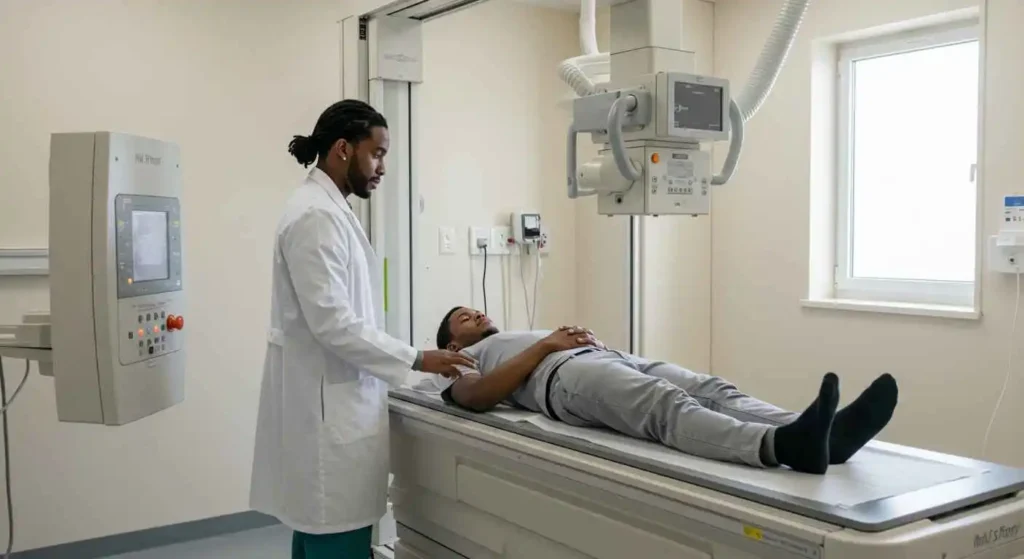The right career is a major decision in your life. You may be a good candidate for a bachelor’s degree in radiologic technology if you are interested in Bachelors in Radiologic Technology and have a keen eye for detail.
This guide will explain what this degree is, why it’s important, and how to pursue it. We’ll provide you with real-world examples, practical advice, and anecdotes to help you make the right decision.
What does a Bachelors in Radiologic Technology mean?
The Bachelors in Radiologic Technology program is a four-year undergraduate degree that prepares students to pursue careers in medical imaging or diagnostics. Students are taught how to use advanced medical equipment such as CT scans, MRIs, and ultrasounds to diagnose and treat their patients.
Learn more about radiologic technology.
This degree is a combination of medical knowledge and technical skills. Graduates are highly valued in hospitals, diagnostic centers, and research institutions.
Why choose a career in radiologic technology?
Sara, one of my best friends, told me once about the experience she had with her father when they visited the hospital. She was surprised at how quickly the team of radiologists discovered his broken rib using an image. This moment made her curious about the people who operate these machines. She decided to continue her studies in radiology technology and is now working at a leading hospital.
There are many compelling reasons why you should choose this career:
-
High demand—Due to the growing healthcare needs, skilled radiologic technologists will be in high demand.
-
Salary—Many professionals in this field earn high incomes.
-
Meaningful work—you contribute directly to the diagnosis of diseases and saving lives.
-
Wide Range of Roles— From X-rays and advanced MRIs to career paths, there are many.
-
Growth Opportunity—You can specialize to become a radiology manager or researcher.
Key Skills You’ll Develop
The Bachelors in Radiologic Technology will give you the technical skills and knowledge to become a professional in healthcare. You will gain the following:
-
Technical knowledge for operating radiographic equipment
-
Patient Care Skills: To ensure comfort and confidence.
-
Critical Thinking for quick and accurate decisions
-
Problem-solving abilities during emergencies
-
Teamwork when working with doctors, nurses, and technicians.
A Step-by-Step guide to pursuing a Bachelors in Radiologic Technology
Here is a roadmap that you can follow:
1. Check Your Eligibility
The majority of universities require completion of high school with science subjects, such as biology and chemistry. It is also beneficial to have a good understanding of mathematics.
2. Select the Right University
Search for accredited colleges. Your degree will be recognized and respected around the world if it is accredited.
3. Understanding the Curriculum
The typical coursework includes:
-
Anatomy & Physiology
-
Imaging Procedures
-
Patient Care & Ethics
-
Medical Terminology
-
Clinical Practice
4. Complete Clinical Training
Experience in laboratories and hospitals is vital. You will apply classroom learning in real patient care.
5. Become Licensed or Certified
To work legally as a radiologic technologist, you will need to pass certification exams in many countries (for instance, the ARRT exam in the U.S.).
6. Discover Specializations
Graduates can specialize in:
-
MRI Technology
-
CT Scanning
-
Mammography
-
Nuclear Medicine
-
Radiation Therapy
Career Opportunities After Graduation
You can choose to pursue careers such as
-
Clinics and Hospitals—as a radiologic technologist or scan specialist.
-
Research Institutes—Contributing to Innovations in Medical Imaging
-
Academia—teaching future radiologic technologists.
-
Medical Equipment Companies as an application specialist or trainer.
This qualification is so widely recognized that some graduates move to other countries.
Salary Expectations
Earnings are affected by the country, specialty, and level of experience. In the U.S., for example, radiologic technologists make around $65,000 per year on average. Although salaries may vary globally, radiologic technologists generally earn a stable and attractive salary compared to other healthcare roles.
Challenges That You Should Know
Radiologic Technology is no different.
-
Long working hours in hospitals.
-
Exposure to radiation
-
Stress emotions when dealing with patients who have serious illnesses
These challenges can be overcome with the right training and a compassionate attitude.
Why this degree is worth it
Imagine this: If doctors prescribe treatments, technologists are the “eyes” that look into the body. Imaging is essential to the treatment process. Without it, doctors would have to navigate in the darkness.
You can enjoy a rewarding career that is not only financially rewarding but also emotionally satisfying.
Final Thoughts
The Bachelors in Radiologic Technology degree is more than a degree. It’s the path to a respectable, stable, and impactful career. You’ll start learning skills that will save lives on your first day. This field is full of opportunities, whether you want to work in a medical facility, do research, or teach.

